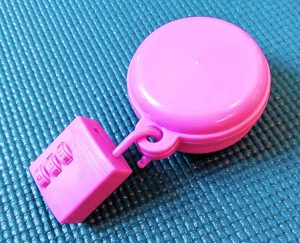 Dr. Lisa David has a dangerous mission for you– her BFF has been changed into a werewolf! Can you solve the clues Thia has left behind to reverse the spell? Or will you and your party become werewolf lunch?
Dr. Lisa David has a dangerous mission for you– her BFF has been changed into a werewolf! Can you solve the clues Thia has left behind to reverse the spell? Or will you and your party become werewolf lunch?
This follow-up to Escape Room in a Box: Werewolf pits you against the werewolf herself with 20+ puzzles to solve cooperatively before time runs out.
Escape Room in a Box: Flashback is a puzzle game for 2-8 players. We played with 2.
Gameplay Overview:
A couple of letters start your group off on the adventure, introducing the theme and general puzzle game rules and ideas. Once the box is opened you have 90 minutes to find clues, unlock real boxes, and code solve in order to escape being eaten by the werewolf. (Beware, cheaters get auto-eaten no matter what the time –play fair!)

The puzzles are constructed in three linear paths with a designation of science & math, word games, and one titled Li-thia (a combination of the two main characters names) which is more general puzzle solving. You can either work together to solve puzzles, pass them around, or work together on multiple tracks. Some may involve math problems, knowing your classics, or for folks that have spent a long time at the bottom of goblin-infested tunnels.
Should you get stuck, there is a book full of hints and one of the answers (though you may incur a penalty for using them). Additionally, there is help available from Alexa if you have the device (this is not necessary to play and you shouldn’t need more than a couple of pencils and one common household item to complete the puzzles).
Your group is working together to find 4 pieces of the Amulet of de-werewolfification. One piece will be found through each path and the final can be procured by solving a puzzle related to the solutions to all three. Unlock all four boxes and reassemble the amulet before time runs out.

Game Experience:
My partner and I are somewhat addicted to puzzle games. Between rooms and board games, we’ve played over 70 in the last two years. Escape Room in a Box was a charming diversion. It’s not intended for full-blown riddle and cipher junkies, but there was enough content both to keep us entertained.

The lockboxes are super fun. Actually having a tangible, physical box and lock really evoked the escape room feel. Our locks all came locked, but I know we’d heard from many folks that they had ‘popped’ open in transit (and one of the letters in the box speaks to the effect).
One of the best features is the sprawl. Some other common escape room type games can only really be worked on by a few players at a time. The Tale of Ord (my #1 game of last year) was somewhat of an exception, as we consistently had all party members working on separate puzzles simultaneously. With Escape Room in a Box: Flashback you can split into 3 groups of 2-3 safely and keep each group working–great for larger groups, families, or smaller classrooms.

Experienced puzzle hunters may find that they stumble onto a few things early simply based on foreknowledge of the genre. Occasionally this led to us having to reset materials to figure out if we’d jumped the gun. If you’re working in a mixed experienced group, I’d definitely recommend letting the least experienced player take the lead. This is one way the game shines for families though—younger kids can direct play while older players can act as the solving agents.
Final Thoughts:
Escape Room in a Box: Flashback was a charming recreation of an escape room in one box. The physical lockboxes add to the experience, though the lock construction is a little wanting. New puzzle gamers and families will find this challenging and fun. The puzzles were interesting, if a little simple. Multi-pathing allows for more players to work together. Experienced puzzlers may want to let the new players in their group take the lead, but should still find entertaining bits in Escape Room in a Box: Flashback.
Final Score: 4 Stars –Family-friendly escape room fun that evokes escape rooms in one board game sized box.
 Hits:
Hits:
• Escape room feel with physical components
• Multiple puzzles at once allowing groups to work together
Cons:
• Inexpensive locks may not remain locked, letting down the joy of popping one open
• Experienced puzzle gamers won’t find much to challenge themselves





















